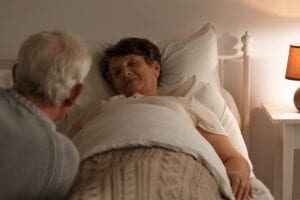Sleep Information for Elderly Adults

If you are a family caregiver of an elderly loved one you might have questions about their sleeping habits. You might feel they are sleeping a lot during the day and not sleeping much during the night. This might seem normal to your elderly loved one. However, you should know that excessive sleeping during the day could be due to a sleep disorder. There is some information that you can learn regarding sleep issues in elderly adults.
How much sleep do elderly adults need?
Have you ever heard that the elderly adults don’t need as much sleep as the younger generation? Many people believe this is true. However, it is not. Some of the reasons that people might believe this include the following:
- Elderly people tend to take naps during the day.
- Elderly people often wake up really early in the morning.
- Elderly people generally sleep less during the night.
Even though these things may be true, elderly adults still need to get enough sleep during the night. Many doctors will recommend that elderly adults get between 7 and 9 hours of sleep every night.
What do you need to know about excessive sleep with elderly adults?
If you are a family caregiver, you may feel that your elderly loved one is sleeping a lot. You might have caught them falling asleep in their favorite chair during the day or on the couch while they watch television. This could be a sign of sleep deprivation. You or their senior care providers should keep an eye on them to see how much or how little they are sleeping at night.
What do you need to know about lack of sleep with elderly adults?
There are many elderly adults who have trouble sleeping at night. The two most common sleep disorders that affect the elderly include sleep apnea and restless leg syndrome. Both of these conditions can cause your elderly loved one to not get enough sleep at night. Fortunately, there are some treatments that can help your elderly loved one if they have these conditions.
Sleep apnea happens when a person stops breathing several times during the night. They could stop breathing for a couple of seconds or even a few minutes. People with sleep apnea tend to wake up tired even after getting their recommended amount of sleep. If you feel your loved one might have sleep apnea, it is best to consult their physician for guidance.
Restless leg syndrome generally sends uncomfortable and unpleasant sensations to a person’s legs. This makes it difficult for them to keep their legs still. Symptoms often start late in the evening and may linger through the night. If your elderly loved one has trouble holding their legs still during the night, you might want to speak with their physician to have them tested for this condition.
Conclusion
Many elderly adults have trouble sleeping at night. If your elderly loved one is sleeping too much or too little, you should contact their physician to see if they have a sleep disorder.
If you or an aging loved one are considering Senior Care in Old Bridge Township, NJ, please contact the caring staff at Lares Home Care 888-492-3538 or 732-566-1112.
Sources
https://www.cdc.gov/sleep/about_sleep/how_much_sleep.html
